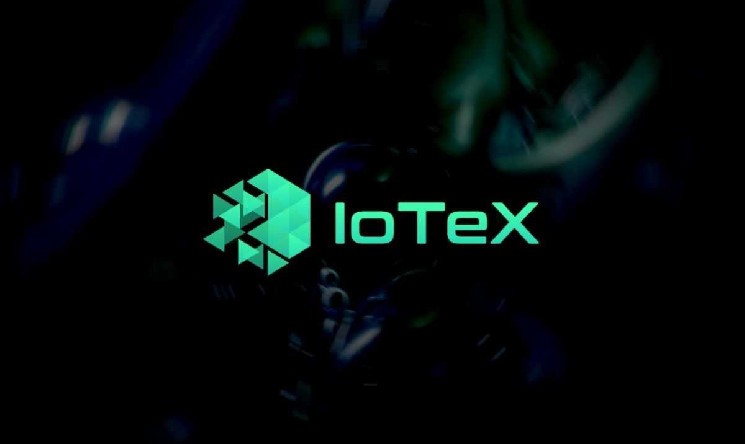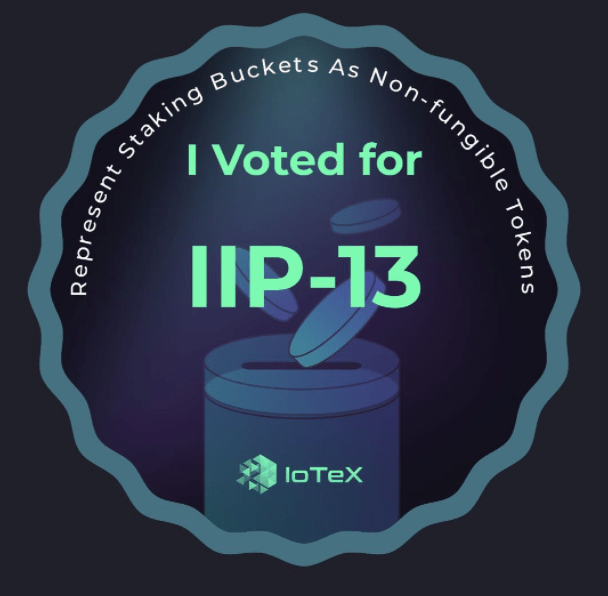IoTeX Adopts SBTs to Reward DAO Governance Proposal Voters

IoTeX has become one of the first blockchain networks to introduce the use of Soulbound Tokens (SBT) to reward their community members for participating in DAO Governance proposal voting.
The adoption of this mechanism was yesterday as it distributed 123 SBTs to the same number of community members who voted in favor of IoTeX’s 13th Improvement Proposal (IIP-13) vote to support ether (ETH) liquid staking derivatives.
Community members staked more than 141 million IOTX (approximately $3.5 million) in favor of the network’s IIP-13 to increase the IOTX staking ratio to enhance network security by expanding the number of validators that process transactions and maintain the blockchain.
The proposal, voted in by 97% in favor, included natively adding support to represent staking buckets as non-fungible tokens so that liquid staking protocols can manage stakes through smart contracts.

That allows developers to launch liquid-staking decentralized applications quickly. It also potentially increases the staking ratio – improving the network’s use case for developers and contributing to the value proposition.
IoTeX CEO and Co-Founder Raullen Chai told Blockchain Reporter in an exclusive interview that this was yet another step forward in his team’s commitment to continue as Decentralized Physical Infrastructure Networks (DePIN) infrastructure providers. It follows the recent launch of W3bstream, the world’s first off-chain compute framework for smart devices and real-world data.
“We decided to start using SBTs because of their uniqueness and utility,” said Chai. “SBTs are a unique type of digital asset that shares some similarities with non-fungible tokens (NFTs). While NFTs represent property or assets with some monetary value, SBTs represent a person’s credentials and reputation.
So, what are SBTs?
Vitalik Buterin, one of Ethereum’s founders, revealed his SBT concept in January 2022 when he told journalists that they are the future of Ethereum and Web3.
SBTs have the potential to be highly valuable in Web3 networks, as they can be used as a reputation indicator instead of relying on money-centric frameworks. For instance, in the current system, a lender would verify a borrower’s bank account balances, credit scores, and repayment history to offer an undercollateralized loan. However, with SBTs representing a person’s credentials, reputation can act as collateral to get an undercollateralized loan.
The lender can verify a borrower’s reputation via their interactions with the community, such as trophies earned from any blockchain network’s Governance Rewards program. These trophies visually represent a member’s on-chain activity, which can now be sufficient security for an undercollateralized loan.
Most DAOs assign voting power based on the number of tokens a member holds. However, DAOs issuing SBTs could prioritize reputation over tokens owned by a member. Additionally, third-party protocols can utilize SBTs to facilitate DAO governance voting and airdrops, among other use cases.
The reputation can be verified via a member’s interactions with the community, making it more difficult for bad actors to control most of the governance tokens and disrupting the network for their gain (known as a Sybil attack).
SBTs can also serve as a digital verification solution for crypto exchange customers that have completed Know Your Customer (KYC) requirements.
Security and more decentralization
“The primary motivation behind IIP-13 is improved security and further decentralization of the IoTeX blockchain,” Chai explained. With the deployment of this feature, builders can quickly launch their liquid staking dApps, such as Lido and Rocket Pool, on the IoTex network.
Liquid staking refers to the exchange of staked ether for tokenized versions of the second-largest cryptocurrency that can be used in Decentralized Finance (DeFi) apps. Uses range from tokens as collateral for loans or margin to trading or earning yield. Staking on the IoTeX blockchain is currently done directly on the network without connecting to smart contracts for support.
“We firmly believe that giving our IoTeX community members SBTs for voting will compel more people to participate in greater numbers in governance proposals moving forward,” Chai concluded.






 Bitcoin
Bitcoin  Ethereum
Ethereum  Tether
Tether  USDC
USDC  Dogecoin
Dogecoin  TRON
TRON  Cardano
Cardano  Chainlink
Chainlink  Stellar
Stellar  Bitcoin Cash
Bitcoin Cash  LEO Token
LEO Token  Hedera
Hedera  Litecoin
Litecoin  Monero
Monero  Dai
Dai  Cronos
Cronos  OKB
OKB  Ethereum Classic
Ethereum Classic  Gate
Gate  VeChain
VeChain  Cosmos Hub
Cosmos Hub  Algorand
Algorand  KuCoin
KuCoin  Stacks
Stacks  Maker
Maker  Zcash
Zcash  Tether Gold
Tether Gold  Theta Network
Theta Network  IOTA
IOTA  Tezos
Tezos  TrueUSD
TrueUSD  NEO
NEO  Polygon
Polygon  Dash
Dash  Decred
Decred  Synthetix Network
Synthetix Network  Zilliqa
Zilliqa  Qtum
Qtum  0x Protocol
0x Protocol  Basic Attention
Basic Attention  Siacoin
Siacoin  Holo
Holo  Ravencoin
Ravencoin  DigiByte
DigiByte  Enjin Coin
Enjin Coin  Status
Status  Nano
Nano  Ontology
Ontology  Hive
Hive  Waves
Waves  Lisk
Lisk  Pax Dollar
Pax Dollar  Steem
Steem  NEM
NEM  Numeraire
Numeraire  BUSD
BUSD  Huobi
Huobi  OMG Network
OMG Network  Bitcoin Gold
Bitcoin Gold  Ren
Ren  Augur
Augur  Bitcoin Diamond
Bitcoin Diamond  HUSD
HUSD